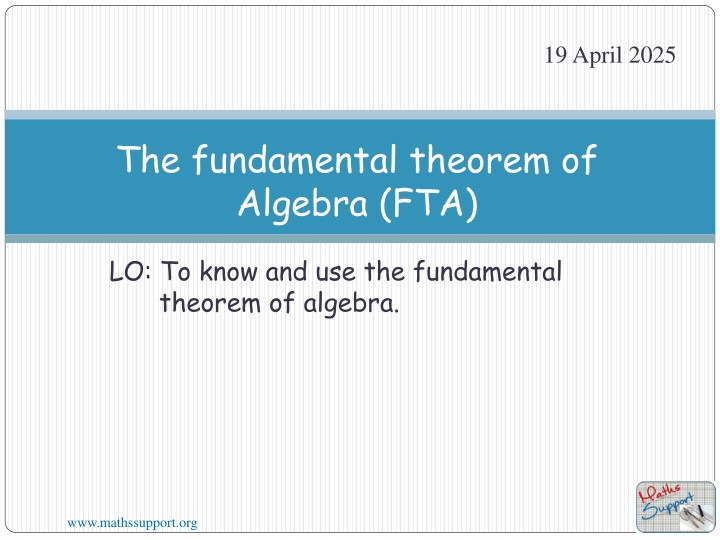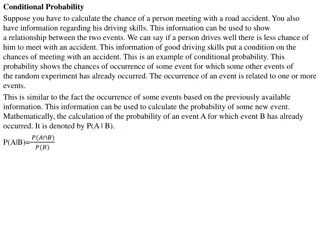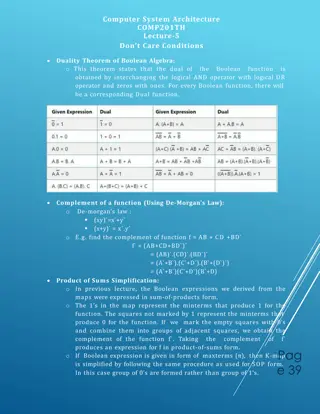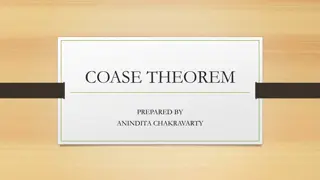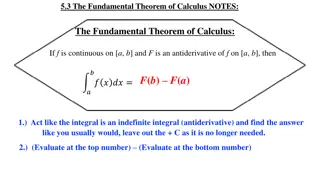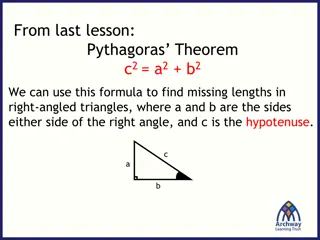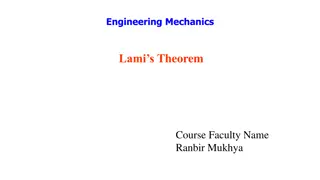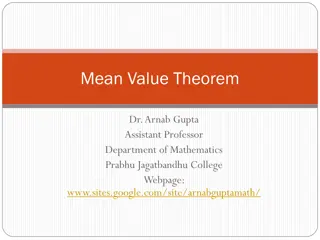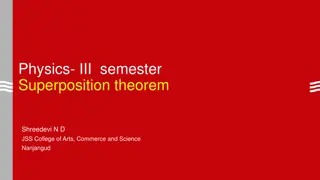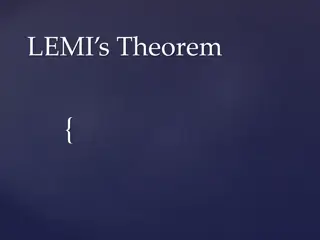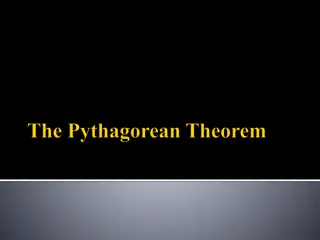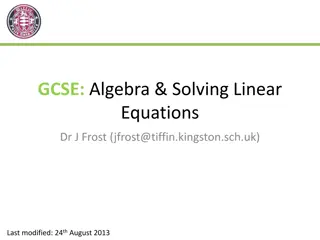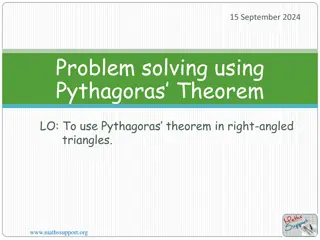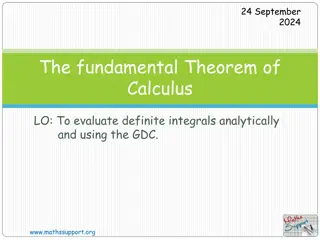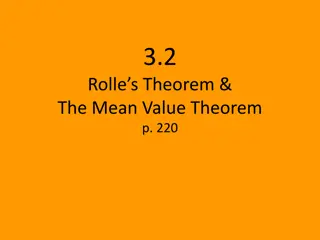The Fundamental Theorem of Algebra
The Fundamental Theorem of Algebra is a vital concept in mathematics that establishes the existence of complex zeros of a polynomial. It explains the properties of real polynomials and their factorization into linear and quadratic factors. Learn how this theorem can be applied to factorize polynomials and determine the number of real and complex solutions.
Download Presentation

Please find below an Image/Link to download the presentation.
The content on the website is provided AS IS for your information and personal use only. It may not be sold, licensed, or shared on other websites without obtaining consent from the author.If you encounter any issues during the download, it is possible that the publisher has removed the file from their server.
You are allowed to download the files provided on this website for personal or commercial use, subject to the condition that they are used lawfully. All files are the property of their respective owners.
The content on the website is provided AS IS for your information and personal use only. It may not be sold, licensed, or shared on other websites without obtaining consent from the author.
E N D
Presentation Transcript
19 April 2025 The fundamental theorem of Algebra (FTA) LO: To know and use the fundamental theorem of algebra. www.mathssupport.org
The fundamental theorem of algebra. P(x) =x4 6x3 + 11x2 6x How many real solutions might it have? Could it have complex solutions? Do we always know how many complex solutions it must have? www.mathssupport.org
The fundamental theorem of algebra. The Remainder theorem and the Factor theorem can be generalised in The fundamental theorem of algebra The fundamental theorem of algebra is one of the most important theorems in mathematics It stablishes the existence of the complex zeros of a polynomial (Points at which the value of the function is zero). www.mathssupport.org
The fundamental theorem of algebra. A polynomial P(x) = anxn+an-1xn-1+an-2xn-2+ +a2x2 + a1x + a0 With real or complex coefficients (an 0) has exactly n zeros, each of which may be written in the form = a + bi where a, b , and some of which may be repeated. There is an such that f( ) = 0 Corollary: Each polynomial P(x) = anxn+an-1xn-1+an-2xn-2+ +a2x2 + a1x + a0 With real or complex coefficients can be written in a factored form Such that k , k= 1, 2, n P(x) = an(x )(x ) (x n) www.mathssupport.org
The fundamental theorem of algebra. Using The fundamental theorem of algebra, the following properties of real polynomials can be stablished. Every real polynomial of degree n can be factorised into n complex linear factors, some of which may be repeated. Every real polynomial can be expressed as a product of real linear and real irreducible quadratic factors (where < 0). Every real polynomial of degree n has exactly n zeros, some of which may be repeated. If p + qi (q 0) is a zero of a real polynomial, then its complex conjugate p qi is also a zero. Every real polynomial of odd degree has at least one real zero. www.mathssupport.org
The fundamental theorem of algebra. Factorize the polynomial f(x) =x4 6x3 + 11x2 6x f(x) =x4 6x3 + 11x2 6x =x (x3 6x2 + 11x 6) Apply Horner s algorithm for x = 1 since the sum of the coefficients is equal to zero 1 6 1 11 5 6 6 1 6 5 0 1 =x (x 1) (x2 5x + 6) Apply FTA to factorise the polynomial =x (x 1) (x 2) (x 3) www.mathssupport.org
The fundamental theorem of algebra. Given that 2 is a zero of the polynomial f(x) =x5 4x4 3x3 + 34x2 52x + 24 And has a multiplicity of 3, factorize f(x) fully Successively apply Horner s algorithm with respect to the multiplicity of the given zero 52 40 24 20 12 12 24 34 1 4 2 2 3 4 14 7 20 2 7 0 2 1 1 12 2 0 14 2 7 7 6 6 0 0 0 1 1 2 6 4 2 3 0 2 1 f(x) = (x 2)3(x2 + 2x 3) Apply the FTA to factorise the polynomial f(x) = (x 2)3(x 1) (x + 3) Factorize the quadratic expression www.mathssupport.org
The fundamental theorem of algebra. Suppose 3 + i is a zero of P(x) =ax3 + 9x2 + ax 30, a Find a and hence find all zeros of the cubic. SinceP(x) is real, if 3 + iis a root, then its complex conjugate 3 imust also be a root. Hence, the quadratic factor corresponding to these two roots is: (x ( 3 + i)) (x ( 3 i)) = (x+ 3 i) (x + 3 + i) Let us expand this factor: = ((x+ 3) i) ((x + 3) + i) = (x + 3)2 (i)2 = x2 + 6x+ 9 = x2 + 6x + 10 Consequently, ax3 + 9x2 + ax 30 = (x2 + 6x + 10) = ax3 3x2+ 6ax2 18x + 10ax 30 = ax3+ ( 6a 3)x2+ (10a 18)x 30 6a 3 = 9 a = 2 Equating coefficients of x 10a 18 = a a = 2 P(x) has zeros 3 i and 3 + 1 (ax 3) Equating coefficients of x2 The linear factor is (2x 3) www.mathssupport.org 2
The fundamental theorem of algebra. One zero of P(x) =ax3 + (a + 1)x2 + 10x + 15, a is purely Find a and the zeros of the polynomial. Let the purely imaginary zero bebi, b 0. Since P(x) is real, both bi, and bi are zeros. Imaginary. Hence, the quadratic factor corresponding to these two roots is: (x bi) (x + bi) = (x2 (bi)2) Let us simplify: = (x2 (b)2 (i)2 ) = x2 + b2 Consequently, ax3 + (a + 1)x2 + 10x + 15 = (x2 + b2 ) (ax + 15 ?2) = ax3+ 15 ?2x2+ ab2x + 15 Equating coefficients of x2 a + 1= 15 ?2 ab2 = 10 Equating coefficients of x ab2 + b2 = 15 Using Using 10 + b2 = 15 The linear factor (ax + 15 ?2) (2x + 3) becomes b2 = 5 P(x) has zeros and 3 Using 5a = 10 a = 2 i 5 2 www.mathssupport.org
Thank you for using resources from A close up of a cage Description automatically generated For more resources visit our website https://www.mathssupport.org If you have a special request, drop us an email info@mathssupport.org www.mathssupport.org
